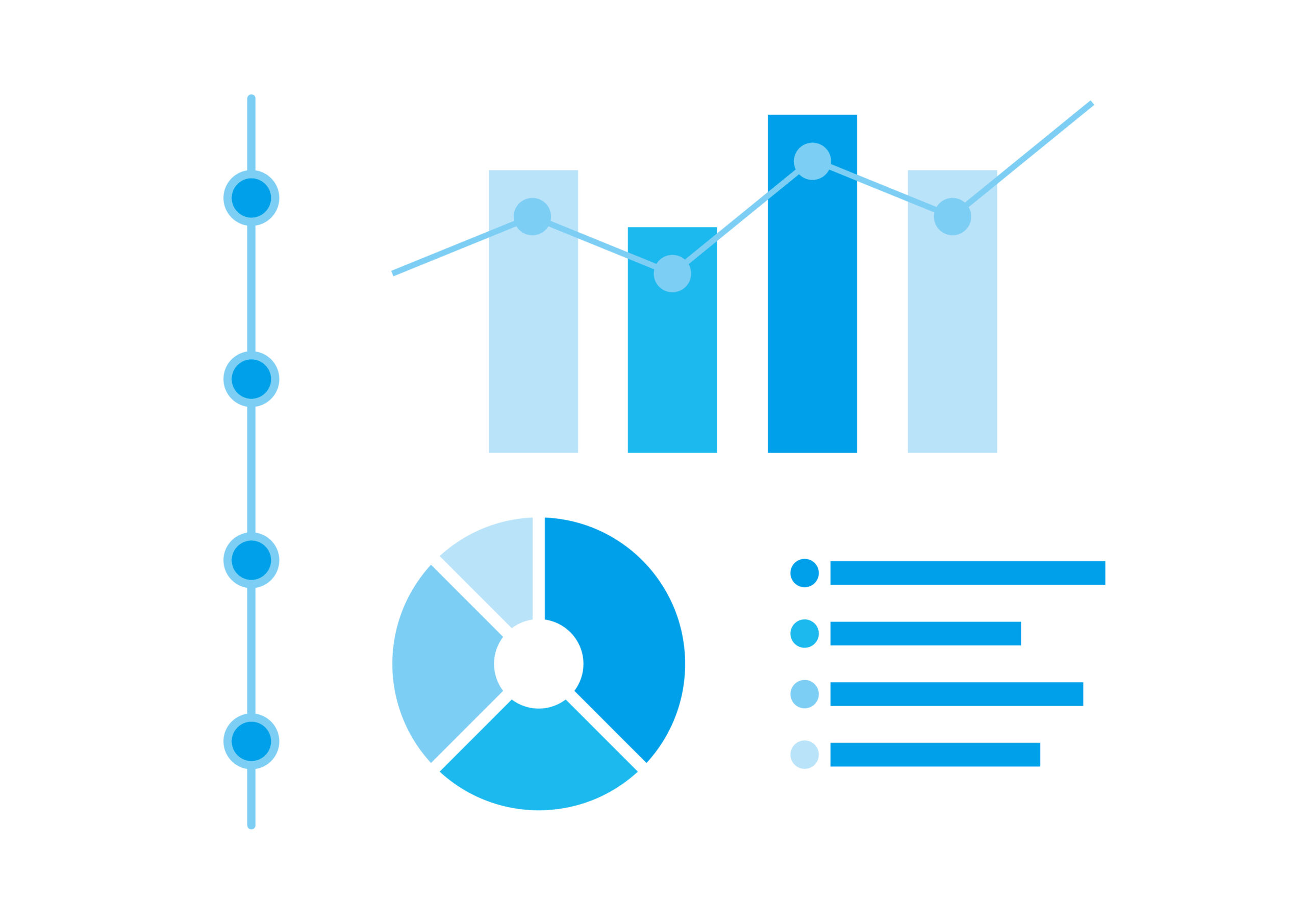今回は、Excelでのグラフの作り方を教えている会話です。
会話
Person A: Hi, I heard you’re interested in learning how to create charts in Excel. I can show you the basics if you’d like.
エクセルでグラフの作り方を学びたいと聞きました。基本的な方法を教えてあげられますよ。

「how to ~(動詞)」で「~する方法」だね。
「charts」の代わりに「graphs」でもOK。
Person B: That would be great! I’m looking to visualize some data for a presentation.
それはありがたいです!プレゼンテーション用にデータを視覚化したいんです。

「I’m looking to ~(動詞)」で、「~をすることを考えている、~したい」みたいな意味。
Person A: Alright, let’s start by selecting the data range you want to include in the chart. Make sure the data is organized with labels for each category or series. In Excel, a category refers to a label on the horizontal axis, while a series refers to a label on the vertical axis.
では、まずはグラフに含めるデータ範囲を選択しましょう。データは各カテゴリーやシリーズにラベルが付いていることを確認してください。Excelでは、「カテゴリー」は水平軸のラベルを指し、一方「シリーズ」は垂直軸のラベルを指します。

最後の文にある、「~, while ~」は、「~である一方、~」のような意味で便利な表現なので覚えておきましょう。

最初に範囲を指定する。そのときに、選択されたデータの一番上の行と一番左の列が、Excelがグラフをつくるときのキーとなるから、そこも空白にしないで(ラベルをつけておいて)おく必要があるんだね。
Person B: Got it. I have the data ready with labels for the different months and corresponding values.
了解しました。異なる月とそれに対応する値のラベルが付いたデータが用意されています。
Person A: Perfect. Now, go to the “Insert” tab on the Excel ribbon and click on the chart type you want to create, such as a column chart or line chart.
それでいいですね。次に、Excelのリボンの「挿入」タブに移動し、作成したいグラフの種類、例えば縦棒グラフや折れ線グラフをクリックしてください。

棒グラフは、「column chart」の代わりに「bar chart」でもOK。ちなみに、Excelの行は「row」、列は「column」だね。
Person B: I’ll go with a column chart for this data. What’s the next step?
このデータでは縦棒グラフを選びます。次はどうすればいいですか?
Person A: After selecting the chart type, Excel will insert a blank chart into your worksheet. Now, you can customize it by adding titles, adjusting the axis labels, and formatting the colors and styles to your liking.
グラフの種類を選択した後、Excelはワークシートに空のグラフを挿入します。ここで、タイトルの追加や軸ラベルの調整、色やスタイルの書式設定などを自分の好みに合わせてカスタマイズできます。
Person B: That’s great! I’ll add a title to the chart and make some formatting adjustments to make it visually appealing.
それは素晴らしいです!グラフにタイトルを追加し、視覚的に魅力的にするために書式を調整します。

「make + 物(目的語)+ ~(形容詞)」で、「物を~の状態にする」という表現だね。
Person A: Wonderful. Once you’re satisfied with the chart’s appearance, you can further enhance it by adding data labels, legends, or even applying different chart styles and themes.
素晴らしいですね。グラフの外観に満足したら、データラベルや凡例の追加、さらには異なるグラフスタイルやテーマの適用などでさらにグラフを魅力的にすることができます。

データラベルの追加は、棒グラフであれば、棒グラフを選択して、右クリックすると選択できます。
Person B: This is really helpful. Thank you for showing me the basics of creating charts in Excel.
本当に助かります。Excelでグラフを作成する基本を教えていただき、ありがとうございます。
Person A: You’re welcome! Feel free to ask if you have any more questions or need further assistance.
どういたしまして!もしあなたに質問があるか、さらなるサポートが必要な場合は遠慮なくお尋ねください。
関連する用語
- Chart – グラフ
- Data series – データ系列
- Axis – 軸
- Category – カテゴリー
- Legend – 凡例
- Title – タイトル
- Data labels – データラベル
- Plot area – プロットエリア
- Gridlines – グリッド線
- Trendline – トレンドライン
- Bar chart or Column chart – 棒グラフ
- Line chart – 折れ線グラフ
- Pie chart – 円グラフ
- Scatter plot – 散布図
- Area chart – 面グラフ
- X-axis – X軸
- Y-axis – Y軸
- Data range – データ範囲
- Chart title – グラフのタイトル
- Data source – データソース
- Data point – データポイント
- Data table – データテーブル
- Secondary axis – 第二軸
- Bubble chart – バブルチャート
- Combination chart – 組み合わせグラフ
- Axis labels – 軸ラベル
- Chart area – グラフエリア


